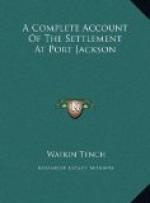Our bosoms consequently became less perturbed; and all our labour and attention were turned on one object—the procuring of food. “Pride, pomp, and circumstance of glorious war” were no more.
The distress of the lower classes for clothes was almost equal to their other wants. The stores had been long exhausted, and winter was at hand. Nothing more ludicrous can be conceived than the expedients of substituting, shifting, and patching, which ingenuity devised, to eke out wretchedness, and preserve the remains of decency. The superior dexterity of the women was particularly conspicuous. Many a guard have I seen mount, in which the number of soldiers without shoes exceeded that which had yet preserved remnants of leather.
Nor was another part of our domestic economy less whimsical. If a lucky man, who had knocked down a dinner with his gun, or caught a fish by angling from the rocks, invited a neighbour to dine with him, the invitation always ran, “bring your own bread.” Even at the governor’s table, this custom was constantly observed. Every man when he sat down pulled his bread out of his pocket, and laid it by his plate.
The insufficiency of our ration soon diminished our execution of labour. Both soldiers and convicts pleaded such loss of strength, as to find themselves unable to perform their accustomed tasks. The hours of public work were accordingly shortened or, rather, every man was ordered to do as much as his strength would permit, and every other possible indulgence was granted.
May, 1790. In proportion, however, as lenity and mitigation were extended to inability and helplessness, inasmuch was the most rigorous justice executed on disturbers of the public tranquillity. Persons detected in robbing gardens, or pilfering provisions, were never screened because, as every man could possess, by his utmost exertions, but a bare sufficiency to preserve life*, he who deprived his neighbour of that little, drove him to desperation. No new laws for the punishment of theft were enacted; but persons of all descriptions were publicly warned, that the severest penalties, which the existing law in its greatest latitude would authorise, should be inflicted on offenders. The following sentence of a court of justice, of which I was a member, on a convict detected in a garden stealing potatoes, will illustrate the subject. He was ordered to receive three hundred lashes immediately, to be chained for six months to two other criminals, who were thus fettered for former offences, and to have his allowance of flour stopped for six months. So that during the operation of the sentence, two pounds of pork, and two pounds of rice (or in lieu of the latter, a quart of pease) per week, constituted his whole subsistence. Such was the melancholy length to which we were compelled to stretch our penal system.




